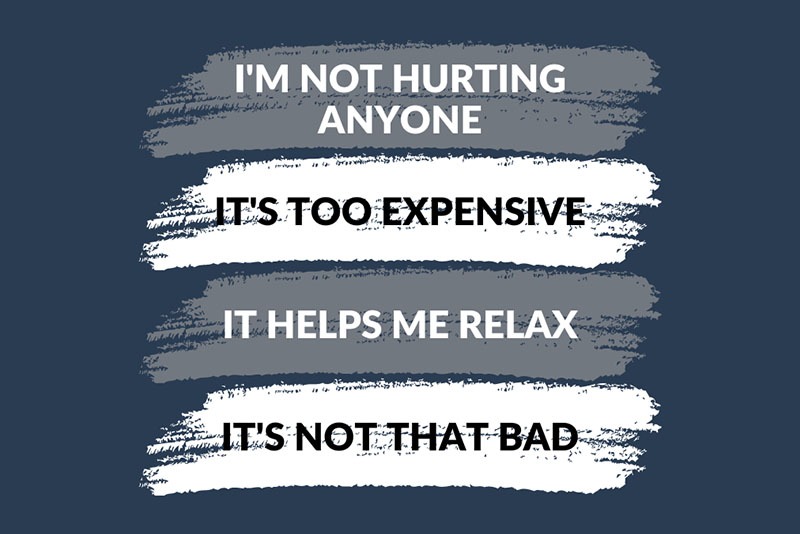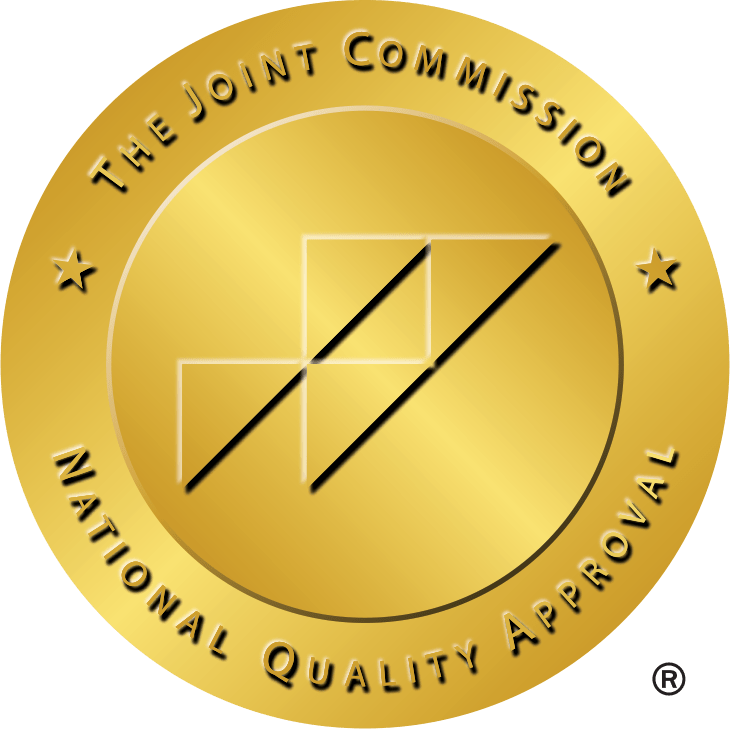Of millions of people struggling with Substance Use Disorder (SUD), only about 10% of them receive treatment[1]. Reasons vary from fear, stigma, and misconceptions about rehab.
Let’s address a series of phrases you may hear from an addict who is in denial or simply misinformed. These are the most common, and maybe even most compelling, reasons why. Then we will give our rebuttals for these excuses for avoiding treatment.
If you know someone who is avoiding treatment, you can base your responses on the following information to hopefully convince them.

1. “I’m Not Hurting Anyone”
This is possibly the biggest lie on the list.
Addiction can tear families apart, ruin marriages and careers, and cause a lot of damage to the user and everyone around them. And time hasn’t made it any better. Drug overdose death rates have been trending upward since 1999 [2].
It’s not a matter if anyone has been hurt by your substance use or not. It’s the potential harm that can come from it.
- 6 people a day die from alcohol poisoning [3].
- About 30 people a day are killed in alcohol-related car accidents [4].
- Children of addicts are 3X more likely to be abused than their peers [5].
If someone has suggested rehab treatment to you, there’s your clue that it is having an impact on other people in some way. Seeing you like this is heartbreaking for them.
2. “It Helps Me Relax”
There’s nothing wrong with unwinding after a long, stressful day at work or to grieve.
Healthy ways of coping put you in a better mood and a more clear state of mind afterwards, whereas substance use causes you to suppress or even mismanage negative feelings.
Make better use of your downtime with a productive or creative hobby such as baking, exercising, playing with a pet, or spending time out in nature.
Those are just a few examples of better ways to simmer down or reflect, and they happen to be very good for the human mind, body, and spirit.
3. “This is Just Who I Am, and It’s Too Late to Change”
First, you weren’t always an addict. Being addicted to a substance is not part of who you are. It’s not a personality trait. It’s a condition. That means it’s manageable.
If you’re still alive, you’re capable of putting in the effort to change. It all starts with changing your mindset and finding the right treatment center for you.
Brooks Healing Center’s staff have seen it all and they will welcome you with open arms.
4. “I’m Not as Bad as Other Addicts”
Shifting attention to another addict doesn’t mean you don’t have a problem. Rather than using another case as a way to avoid discussing your situation, consider it a warning of just how bad things can get if things don’t change soon.
You don’t have to hit rock bottom to be qualified for treatment. The sooner you start, the better.
5. “Treatment Doesn’t Work. People Just Start Up Again After They Get Out.”
What works for one person may not work for you. That’s why there are multiple treatment programs available.
Relapse isn’t a sign of failure. It’s part of the treatment process. The key is learning how to pick yourself up after making a mistake, make an effort to get better every day, and eventually free yourself to a more quality way of life without using.
Recovery isn’t a quick fix. It’s a lifelong journey.
Once you’ve successfully completed your treatment program, you must continue to make an effort to stay off the substance. That doesn’t mean treatment isn’t effective. Rather, it proves just how serious addiction is.
6. “It Takes Too Long”
It’s true that rehab can take an extended amount of time. The process includes patient screening, the detox process, and any therapy sessions deemed beneficial.
That’s still far less time than spending the rest of your life trapped in your substance misuse. Is that any better use of your time?
You didn’t become an addict overnight, and you certainly won’t get sober overnight. Whether you’re in rehab for 30 days or a year, that small window of time can change your life.
Also, rehab doesn’t necessarily mean you are confined to one location for an extended period of time. Brooks Healing Center offers partial hospital treatment, where you spend a few hours a day in treatment then spend evenings and weekends at home.
Plus, telemedicine options are growing more common each year, and new treatments are coming available. Sitting in what can feel like a prison cell is no longer the only way to overcome Substance Use Disorder.
7. “It’s Too Expensive”
So is substance use, but that costs more than just money. It costs your physical, mental, and emotional well-being. It costs your opportunities for career growth. It costs healthy friendships, relationships, and families.
If you stay on this path, money isn’t the only thing it’ll cost you.
There are many resources available to help you afford the treatment you need.
Insurance
Most treatment centers – including Brooks Healing Center – accept most insurance plans and financing options, so you can get treatment sooner.
Employee Assistance Programs
Some employers offer free and confidential resources to assist their staff with personal matters that prevent them from doing their job well. This includes providing assistance to get rehab for SUD, mental health, and other personal issues.
Speak to your company’s HR department to learn more about EAP available through your job.
Now, you may be concerned about what your boss will do if they find out about your addiction. This is actually covered under the disability section of the Equal Employment Opportunity Commission policy [6].
Final Thoughts
If you can afford to spend your money on your drug of choice, you can afford to get professional help to improve your life in the long run.
8. “If I Open Up About It, I’ll Lose Custody of My Child(ren).”
No, continuing to misuse substances and doing nothing to change will be what takes your family away. Or worse, your kid(s) may grow to resent you or could even follow in your footsteps.
Addiction doesn’t just impact you. It’s a family disease. A treatment center not only has the resources to help you, but offer family counseling for your children as well.
You won’t lose custody if you’re actively seeking treatment and making an effort to get better.
If this is your fear, this should motivate you to seek treatment, not avoid it.
9. “I Can Quit Whenever I Want. I Just Don’t Want to.”
This is half true. You may not want to stop now. Chances are, you’ll never be ready to quit. Quitting on one’s own freewill -while possible- is very difficult to do alone. In extreme cases, it can even be dangerous without medical assistance (especially in the case of alcoholism).
Click here to read the reasons why you shouldn’t try to detox at home without medical supervision.
10. “Everyone Will Treat Me Differently If They Find Out”
This is definitely possible. Addiction is still very stigmatized in society. We’re always supposed to have our act together, be on 110% all the time, and never show weakness.
And yet, people are surprised when someone hits rock bottom without anyone having the faintest idea anything was wrong.
The fear of being publicly shamed for addiction typically comes in one of three forms: your relatives, people who hardly know you, and potential employers.
Behind Closed Doors
Family members -while they mean well- can say hurtful things such as “I raised you better than that.” or “I’m so glad my kid isn’t like that.”
This can certainly make it hard for you to open up about your problems if you feel like your parents will be disappointed in you.
Getting you the help you need will not only help you get better, but also gives your family the opportunity to learn and understand that addiction is a disease, not a sign of failure on their end nor yours.
Outside Looking In
It’s easy for outsiders to judge your personal situation. While external judgment is a very real thing, it’s still not a reason to avoid getting the help you need.
Addiction doesn’t make you a failure. It almost always means you were dealing with something else before that and addiction was your way of dealing with it.
Rehab not only manages addiction recovery, but also helps patients heal with unresolved trauma that you may not even realize you have.
Know Your Rights
This is a valid concern as using your past against you can prevent you from progressing in your career. Luckily, there are legal protections in place to make sure this doesn’t happen, as long as you maintain recovery.
Addiction treatment is included under Chapter 4 [7] of the Americans with Disabilities Act (ADA) which covers individuals “who are currently participating in a rehabilitation program and no longer engaging in the illegal use of drugs”.
Under the Equal Employment Opportunity Commission, employers must give you paid leave while you are getting medical treatment for substance abuse, and you are entitled to get your same job back once you’ve completed the program.
Recovery is Possible
If you’re trying to convince someone to seek treatment, the last thing they need is “tough love”.
Addiction is a complex issue often co-occurring alongside an unaddressed problem the user has struggled with for a long time. In order to get better, the user needs to feel understood.
Until you’ve been where they are, it’s hard to truly understand.
Brooks Healing Center is no ordinary rehab clinic. Our facility was founded by a recovered addict who personally experienced the worst uglier side of the recovery industry. It’s our mission to provide the best care for each individual that walks through our doors.
To learn more about what you can expect during your recovery journey with Brooks, click here.
Sources:
- Spouse Of An Addict – Discovery Institute of New Jersey (discoverynj.org)
- Drug Overdose Deaths in the United States, 1999–2019 (cdc.gov)
- Alcohol Poisoning Deaths | VitalSigns | CDC
- Drunk Driving Statistics in 2023 | The Zebra
- Families Affected by Parental Substance Use | Pediatrics | American Academy of Pediatrics (aap.org)
- Enforcement Guidance on Reasonable Accommodation and Undue Hardship under the ADA | U.S. Equal Employment Opportunity Commission (eeoc.gov)
- Chapter 4 – Substance Abuse under the ADA (usccr.gov)













